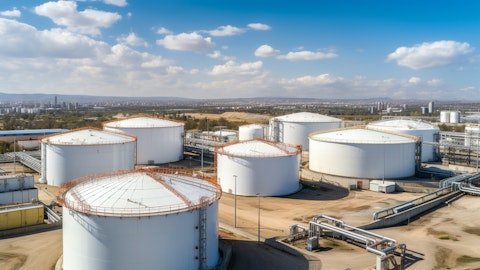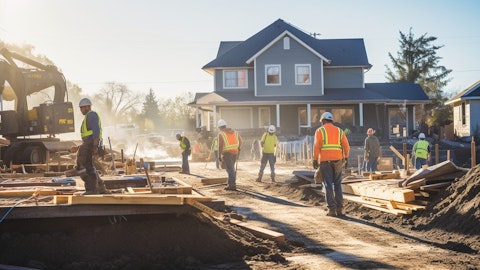Sotera Health Company (NASDAQ:SHC) Q1 2025 Earnings Call Transcript May 2, 2025
Operator: Good morning. And welcome to the Sotera Health First Quarter of 2025 Earnings Call. All participants will be in a listen-only mode for the duration of the call. [Operator Instructions]. Please also note that this event is being recorded. I would now like to turn the conference over to Vice President of Investor Relations and Treasurer, Jason Peterson. Jason, I turn the call over to you.
Jason Peterson : Good morning, and thank you. Welcome to Sotera Health’s first quarter 2025 earnings call. You can find today’s press release and accompanying supplemental slides on the investor section of our website at soterahealth.com. This webcast is being recorded, and a replay will be available in the investor section of the Sotera Health website. On the call with me today are Chairman and Chief Executive Officer, Michael Petras and Chief Financial Officer Jon Lyons. During the call, some of our comments may be considered forward-looking statements. The matters addressed in these statements are subject to risks and uncertainties that could cause actual results to differ materially from those projected or implied. Please refer to Sotera Health’s SEC filings in the forward-looking statement slide at the beginning of this presentation for a description of these risks and uncertainties.
The company assumes no obligation to update any such forward-looking statements. Please note that during the discussion today, the company will present both GAAP and non-GAAP financial measures, including adjusted EBITDA, adjusted EBITDA margin, tax rate applicable to net income, adjusted net income, adjusted EPS, net debt, net leverage ratio, and free cash flow, as well as constant currency comparisons. A reconciliation of GAAP to non-GAAP measures for all relevant periods may be found in the schedules attached to the company’s press release and in the supplemental slides to this presentation. The operator will be assisting with the Q&A portion of the call today. Please limit yourself to one question and one follow-up so that we can give everyone an opportunity to ask questions.
If you have any questions after the call, please feel free to reach out to me and the Investor Relations team. I will now turn the call over to Sotera Health Chairman and CEO, Michael Petras.
Michael Petras: Good morning, everyone. And thank you for joining Sotera Health’s first quarter 2025 earnings call. Today we announce a solid start to the year as we met or exceeded our expectations across each of our lines of business to deliver mid-single digit, top-line growth, and double-digit bottom line growth on a constant currency basis compared to the first quarter of 2024. Total company revenues increased 2.6% or 4.4% on a constant currency basis, and adjusted EBITDA increased 8.8% or 11.2% on a constant currency basis compared to the first quarter of 2024. We delivered adjusted EPS of $0.14 for the quarter, a $0.01 improvement versus the same period last year. Sterigenics, our largest reporting segment, delivered top-line growth in line with what we communicated during our fourth quarter 2024 earnings call, with margin expansion of approximately 30 basis points versus the first quarter of 2024.
Sterigenics has a leading position in a $4.5 billion sterilization service addressable market with positive underlying trends driven by aging population, health care spending, product innovation, and stringent regulatory requirements. The Sterigenics team excels at delivering on these requirements, which is a critical source of advantage in capturing and retaining customer volume. We are in a strong position and are optimistic as today’s sterilization volumes continue to improve. Nordion delivered higher revenue for the first quarter than anticipated as some Cobalt-60 shipments originally scheduled for the second quarter of this year shifted in the first quarter at the request of our customers. This shift in timing will impact second quarter revenues, but the full year outlook for Nordion remains unchanged.
Nelson Labs outperformed the expectations for the first quarter that we outlined during our fourth quarter 2024 earnings call. Improved first quarter core lab testing volumes partially offset the revenue headwind from expert advisory services. The Nelson team continues to do a great job of lab optimization and price performance, which resulted in 479 basis point margin expansion versus the first quarter of 2024. This marks the 3rd consecutive quarter of year-over-year Nelson Labs margin expansion and demonstrates continued progress towards our low to mid-30s margin target. This morning, we are reaffirming our outlook from our February earnings call. As a reminder, our 2025 outlook calls for revenue growth in the range of 4% to 6% and adjusted EBITDA growth in the range of 4.5% to 6.5% on a constant currency basis versus 2024.
Jon will update you on FX, which is improving, versus our prior outlook. I wanted to take a moment to touch on the topic of tariffs. We do not expect the current tariff policies to have a material impact on our business at this time. Approximately 85% of total company revenue is service revenue, and we believe the strategic service-based structure positions the company well to navigate the current tariff environment. Nordion, our one product business, sells Cobalt-60 from Canada into the United States. Currently, Cobalt-60 is exempt from tariffs under the USMCA. Before I hand it over to Jon, I’d like to share a recent example that touched the lives of so many and demonstrates the important value we deliver to our customers across our businesses.
Together, our teams across Nelson Labs and Sterigenics recently played a critical role in securing FDA clearance for the first ever bionic pancreas. At Nelson Labs, our scientists performed the biocompatibility testing, while our regulatory experts helped our customers navigate the numerous requirements to get the product to market. Our team at Sterigenics then provided the mandated product sterilization, which is crucial for device use and patient safety. Our integrated expertise in science, quality, and navigating the regulatory environment provides our customers with the peace of mind that their products will be safe. For insulin-dependent diabetic patients, this means 100% of their insulin doses can be fully automated, and this innovative device can connect to numerous continuous glucose monitors.
This is a great example of how we get involved early in the development phase for new products to serve our customers and grow our business, ultimately shifting product mix to higher growth and higher value segments. Our mission of safeguarding global health comes with great responsibility, and every day I’m proud to see our teams living our mission. Now, Jon will take us through the financials in more detail.

Jonathan Lyons : Thank you, Michael. I will begin by covering the first quarter 2025 highlights on a consolidated basis, and then provide some details on each of the business segments along with updates on capital deployment and leverage. I will then finish with additional details on our 2025 outlook. On a consolidated total company basis, first quarter revenues increased by 2.6% to $255 million, or 4.4% on a constant currency basis compared to Q1, 2024. Foreign currency presented a headwind of 180 basis points for the quarter, which was most pronounced in our Canadian-based Nordion business. Also, as a reminder, there was one less selling day in the quarter versus Q1 2024. Adjusted EBITDA increased by 8.8% to $122 million, which equates to an 11.2% growth rate on a constant currency basis.
All three businesses expanded margins, translating to a total company adjusted EBITDA margin of 47.9%, which is a 276 basis point increase from first quarter of 2024. Interest expense for Q1, 2025 improved to $41 million versus $42 million in Q1, 2024. Net loss on a GAAP basis for Q1, 2025 was $13 million, or $0.05 per diluted share, inclusive of the pending and previously disclosed $31 million settlement of EO claims in Illinois. That compares to a net income of $6 million, or $0.02 per diluted share, in first quarter 2024.Adjusted EPS increased to $0.14 per share, which is a $0.01 improvement versus Q1, 2024. Now, let’s take a closer look at our segment performance. In the first quarter, Sterigenics delivered 1.9% revenue growth to $170 million or 3.9% on a constant currency basis, which was consistent with the expectations we communicated during our Q4, 2024 earnings call.
Revenue growth for the quarter was primarily driven by favorable pricing of 4.1%, which was partially offset by unfavorable foreign currency exchange rates of approximately 2%. Segment income grew 2.5% to $88 million, driven by favorable pricing partially offset by inflation and changes in foreign exchange rates. Nordion’s first quarter revenue increased 36% to $33 million compared to the same period last year, or 40.6% on a constant currency basis. As Michael previously mentioned, revenue came in higher than expected as some Cobalt-60 shipments originally scheduled for Q2, 2025 occurred in Q1. Total volume and mix improved 39.3% in the quarter. Partially offsetting this increase was an approximate 500 basis point headwind from a stronger U.S. dollar versus the same period last year.
Nordion’s segment income increased approximately 62% to $17.4 million versus Q1 of 2024, and segment income margin expanded nearly 860 basis points, primarily driven by volume and mix growth. Nelson Lab’s first quarter 2025 core lab testing volume and mix modestly exceeded our expectations, which were tempered by the expected decline of expert advisory services revenue. Nelson Lab’s revenue of $52 million declined by 9.3% as favorable pricing of 2.7% and improvement in core lab testing was offset by the expert advisory services impact and unfavorable changes in foreign currency exchange rates of approximately 80 basis points. Segment income increased by 7% to $16 million, while segment income margins expanded nearly 480 basis points. These increases were driven by favorable volume and mix from improved core lab testing, pricing, and lab optimization, partially offset by the expected decline in expert advisory services.
Now we’ll touch on the balance sheet, cash generation, and capital deployment. The company’s liquidity position remains strong. As of the end of Q1, 2025, we had $715 million in available liquidity, which included more than $300 million of unrestricted cash and $410 million of available capacity under our revolving line of credit. As you may have seen in our press release this morning, I’m pleased to announce that we have successfully closed an amendment to our revolving credit facility. The amendment added approximately $175 million in liquidity while extending maturity to April of 2030. We’d like to thank our bank group for their continued support of the company. We delivered positive operating cash flow in the quarter of approximately $56 million.
Capital expenditures for the first quarter of 2025 totaled $20 million. Finally, we finished the quarter with a net leverage ratio of 3.6 times and improvement from net leverage of 3.7 times at the end of 2024. As Michael mentioned, based on the first quarter and what we see for the remainder of this year, we are reaffirming all outlook items we provided in February with the exception of our foreign currency assumption, which has improved. To recap, for full year 2025, we expect total revenues to grow in the range of 4% to 6% on a constant currency basis. We expect to generate operating leverage resulting in margin expansion and adjusted EBITDA growth in the range of 4.5% to 6.5% on a constant currency basis. In February, we indicated an approximate foreign exchange headwind of 2.25% on revenue and 2.5% on adjusted EBITDA, with the first three quarters of the year having the most pronounced impact.
Based on average March exchange rates, we now expect a foreign exchange headwind of approximately 1.25% on revenue and 1.5% on adjusted EBITDA, with the first three quarters of this year still having the most pronounced impact. We do not anticipate the current tariff policies to have a material impact on our business at this time. We continue to expect total company price to be near the midpoint of our long-term stated range of 3% to 4%. We expect Sterigenics volumes to improve throughout the year, with full year constant currency revenue growth in the mid-single digits versus 2024. For Nordion, we still expect revenues for the first and second half of 2025 to be similar to 2024, with constant currency full year revenue growth in the mid-single digits.
I also want to provide an update to the revenue risk associated with Russian supplied Cobalt. We have not experienced any disruption in the supply, and as of today there is an approximate risk of between 0% to 2% of total company 2025 revenue. We expect Nelson Labs Q2, 2025 revenue to decline in the low to mid-single digits versus Q2 2024. This is an improvement over the decline we saw in Q1. We continue to expect full year 2025 constant currency revenue growth of low to mid-single digits and margin improvement at Nelson Labs. Interest expense is expected to be between $155 million and $165 million, based on the current forward rate curve. We are projecting an effective tax rate applicable to adjusted net income in the range of 33% to 35%. Adjusted EPS is expected to be in the range of $0.70 to $0.76, and we expect a fully diluted share count in the range of 286 million to 287 million shares on a weighted average basis.
From a capital deployment standpoint, we will continue to prioritize organic growth and deleveraging, as well as opportunistic M&A. We continue to expect capital expenditures to be in the range of $190 million to $210 million in 2025. As we have previously stated, we expect capital expenditures to decrease over the next few years to approximately $110 million in 2027. We expect this decrease in CapEx along with revenue growth will help us achieve our goal of generating between $500 million to $600 million in free cash flow over the next three years. Our guidance does not assume any M&A activity. Finally, we anticipate continued slight improvement in net leverage ratio in 2025. I’ll now turn the call back over to you, Michael.
Michael Petras: Thank you, Jon. We’ve consistently demonstrated the ability to sustain growth and navigate challenges through varying market conditions, and we expect to do so again in 2025. In this quarter’s earnings presentation posted to our website, soterahealth.com, we included a slide for reference illustrating Sotera Health’s 19 consecutive years of revenue growth going back to 2005, which is as far back as our audit financials go. This includes growth during the Great Recession of 2008 and 2009, as well as the COVID pandemic, which all demonstrates the resiliency of our business model and diversity of our customer base. We continue to focus on the priorities we highlighted during our November 2024 Investor Day. These priorities, again, are; one, excellence in serving our customers with end-to-end solutions; two, winning in growth markets; three, driving operational excellence to enhance free cash flow; and, fourth, disciplined capital deployment.
At this point, Joe, let’s open the call up for Q&A. Thank you.
Q&A Session
Follow Sotera Health Co (NASDAQ:SHC)
Follow Sotera Health Co (NASDAQ:SHC)
Receive real-time insider trading and news alerts
Operator: We will now begin the question-and-answer session. [Operator Instructions] Our first question here will come from Patrick Donnelly with Citi. Please go ahead.
Patrick Donnelly : Hey, guys. Thanks for taking the questions. Michael, maybe one for you on the tariff side. It seems like you guys are navigating that pretty well. Can you just talk through it? It sounds like very minimal, if any impact. It sounds like Nordion is exempt. Just the confidence level, all of that in the case. Are there any small impacts that you guys are offsetting, price, anything like that? I just want to talk through the backdrop and get a sense that you guys are navigating it pretty well here.
Michael Petras: Yeah. Good morning, Patrick. Yes, I would say at this point, we’re pretty confident, based on the current regulations that are out there and policies. We’re confident we’ll not have a material impact on the company. The largest component that we are following was Cobalt from Canada to the U.S. as I referenced, and that falls under USMCA. We have some smaller direct and indirect, but we don’t see it as a material item for the company.
Patrick Donnelly : Okay, that’s good news. And then maybe one, just on kind of the backdrop here. Sterigenics, the recovery continues, which is nice to see. Any change as to how you are thinking about it? I know the expectation has been pretty gradual, essentially what we’re seeing on the volume side, but I would love to just pull the curtain back a little bit on what you are seeing on that front? How you are thinking about volumes, both for Sterigenics and Nelson? And where we are in our recovery path there?
Michael Petras: Yeah, I would say we’re more optimistic on the volumes. As we’ve signaled here, we’ll see continued improvement throughout the year. We did see improvement throughout the quarter, and we’re optimistic based on what we are seeing here, even beginning, early stages of the second quarter. You know as we said, these businesses are well-positioned with our customers. As a matter of fact, we just got our customer survey results again, which came back very strong, and both Nelson and Sterigenics, we’re starting to see volumes improve, which has given us confidence to reaffirm our guide as we communicated.
Patrick Donnelly : All right. Good to hear. Thanks, Michael.
Operator: And our next question will come from Brett Fishbin with KeyBanc. Please go ahead.
Brett Fishbin : Hey, guys. Thank you very much for taking the questions. Just wanted to follow-up on some of the Nelson Labs margin trends, notable year-over-year improvement, and better than we were expecting, so definitely understand the favorable mix element at play. But maybe if you could just expand on some of the other factors that you are calling out that have been driving some of the improvement there and how you’re thinking about the trajectory from, like 1Q levels for the rest of 2025.
Jonathan Lyons: Yep Brett, I’ll take that. You know as we’ve said multiple times, what drives that business is new regulation, new product spend, sterilization volumes, we’re seeing that. We’re seeing that in this business. There’s a couple of key regulatory pieces that we’ve been working on and monitoring with our customers for several quarters. Things around reprocessing, testing around some of the bioprocessing products. We’re starting to see that volume start to play in, which is what Joe and the team have been calling out all along, and we’re getting more and more comfortable as these volumes improve. As we said, we expect it to happen throughout the year. So we’re seeing routine and validation volumes improving. And as far as the margin rates, we’ve messaged consistently here for the last several quarters that we see this business in the 30’s and continue to improve, and we’ve seen it the last several quarters improvement.
They continue to deliver price. They’ve got the labor piece in place. As you know, over the last several quarters we’ve been very stable on the labor side, and we’ve been able to show the margin improvement as we predicted and said would come through. So, you know the team’s doing a really nice job with that, all while keeping service at very high levels. I just saw some net promoter scores yesterday that were probably some of the highest I’ve seen in several years. So really, really proud of what that team’s doing. And listen, the customers value what we do. We have one customer right now, for example, that we’re seeing some volume come in that we expected. They’ve had some challenges with the regulators. We’ve been there to help them solve those challenges, and we’re seeing that volume play out in the quarters ahead, which is great.
So the team’s doing a really nice job, and it’s proven out exactly what we said we saw with this business. Regulation helps this business. Customers getting in the challenges and need our expertise, routine volume coming in from sterilization, and then also new product spend from VC or wherever it may be. So really proud of what the team continues to do there.
Brett Fishbin : All right. Thanks for that color. And then just for my follow-up, I just wanted to maybe kind of ask like a similar question on the Sterigenics volume growth. I think you had just like a comment that you are starting to see like some signs of improvement. It’s on the volume front. Are there any particular like end markets, as in the more med tech or like recovery and bioprocessing or like modalities? Like any more detail in where you’re starting to see signs of improvement that are expected to drive what you’ve said is the continuous improvement for the rest of 2025? Thanks very much.
Michael Petras: Yeah. Yeah Brett, the Sterigenics team throughout the quarter saw improvement in volumes. We see that continue as I had mentioned in my comments. Bioprocessing has had significant growth over prior year and sequential growth, but again, it’s a small portion of our total business. We mentioned to you that there were a couple customers that had some challenges that we are working through with them. But when you take those out, the underlying trends on a core customer base is pretty strong. So we feel pretty good about where we’re at in the outlook, and the volumes continue to improve throughout the year as we communicated.
Brett Fishbin : Thank you very much.
Operator: And our next question will come from Matt Sykes with Goldman Sachs. Please go ahead.
Matt Sykes : Hi, good morning. Thanks for taking my questions. Maybe just, it’s great to see the recent settlement on the Illinois cases. Maybe just talk through how your kind of legal strategy has evolved and how you assess the risk on ongoing cases. Your risk strategy differs from state-to-state. Just maybe sort of an update on that process.
Michael Petras: Yeah. I would just tell you, I’m not going to get into a ton of details. We have plenty of disclosures out there in our filings that you could see. But listen, we are confident that at this level of emissions from our facilities, we’re not causing cancer, okay. And listen, we have empathy for patients that have cancer, that’s very tough on family. We’re going to get in the court system, and we’re going to vigorously defend ourselves. As long as we have the opportunity to put on a case with the science and the facts, which we proved in the Fornek trial, we feel we’ll be victorious and we’ll continue to look at that situation. You know, every one of these jurisdictions are slightly different, the judge, the plaintiff, the circumstances around that, what’s allowed in the evidence, and we’ll continue to evolve our strategy.
There’s certain things we look for as we go through this process, and we’ll continue to play that out. But we’re going to vigorously defend ourselves, because this company operates in a safe and compliant manner. And if the science is front and center, we feel very confident of our position.
Matt Sykes : Great. Thanks for that. And then just maybe an update on sort of cross-selling initiatives between Nelson and Sterigenics. Kind of what have you done in terms of better coordinating those sales touch points and kind of anything that you’ve kind of done on the incentive side to encourage that cross-selling opportunity?
Michael Petras: Yeah, so we’ve had incentives in place for the last couple of years. As we mentioned at our Investor Day, this is an area we’re going to continue to grow at our XBU with some of our key strategic customers around key categories. You know, BJ is leading that effort across the company. He’s building out the team around that. We’re making nice progress on the service side of it. Our embedded labs within Nelson Labs, it gets a lot of volume from the Sterigenics side. It continues to grow and deliver significant margin, which has been very good. And I gave an example on today’s call of one product example. We’re working end-to-end with our customers on solutions in a growing segment of the market. And remember, approximately 70% of the Sterigenics and Nelson Labs revenue comes from shared customers. So we feel good about the continued progress we’re making there, and our customers are responding and reacting in a positive manner as well.
Matt Sykes : Great. Thanks Michael.
Operator: And our next question will come from Luke Sergott with Barclays. Please go ahead.
Luke Sergott : Great. Thanks, guys. I just wanted to touch first on the kind of the margin here from – you know I understand that you had elevated 1Q from Nordion. But as you pulled that forward, just help us frame what we should be looking at from a 2Q margin perspective.
Michael Petras: I would just say, just on the Nordion side, recognize that that volume just shifted from second quarter to first quarter. One other point Luke that I want to make sure we call out is, this was one last day in the quarter, in the first quarter, all right. So I think that’s important to note as well. But when we look at overall, we expect the margin improvement throughout the year to really come from the Nelson side, pretty consistent margin rate in the other businesses. That’s how I think about it going forward.
Luke Sergott : All right. Great, thanks. And then on Steri and the volumes, like your guide here implies, I think that you said previously kind of holding this pricing level flat, so that implies that your volume kind of steps up to that low to mid-single digit growth by the end of the year. I’m just thinking about in the out years of like, how much of this is just due to the comp dynamic. I assume there’s some of that in there. But should we expect that with the elevated device utilization that’s been going on, you don’t have any more destocking or anything. Is this kind of like a – should we be thinking about volumes resetting a little bit higher?
Michael Petras: Yeah. So think about what we said in the long-range guide in the business. Steri would be mid-single digits to the high-single digits. They’d be in the price right in the middle, on the price range of that 3% to 4% or on the higher end of that if you actually think about it. So you can kind of plug it from there, what we’d expect volumes to look like over the longer range.
Luke Sergott : Cool. Thank you.
Operator: And our next question will come from Dave Windley with Jefferies. Please go ahead.
Dave Windley : Hi. Thanks for taking my questions. Good morning. I’m going to try a slightly different twist on the Steri volume questions. I’m wondering if your expectation of continued improvement is normalization of the two customers Michael that you called out. Is it continued rising volumes in the market generally, and you ride with that? Is it improving market or wallet share with your customers? I’m just trying to better understand what causes your volume – you know what’s the disconnect, essentially between what has been pretty good med device volumes and yours, and how does that narrow or converge? Thanks.
Michael Petras: Yeah David, thank you. Pretty much all of those at you, all of the above play into it, right? So we’ve got a couple of customers, two in particular that I referenced in the past that had some challenges. We’ll work through that as the year progresses. We are seeing volumes continue to ramp up in other areas across multiple categories. We haven’t talked about inventory resets or anything like that for quite some time, and we feel that that’s in a stable environment. And our facilities are running pretty darn well, right. You know also David, somebody comes in when you have a shutdown and things of that nature that all play out, but overall Mike and the team are optimistic with what they are seeing. The execution with the customer base in the facilities is playing out.
So it’s kind of a combination of all those. You know, a question was asked earlier about bioprocessing. That’s playing into it. But again, it’s a small portion for our business, but that’s had a good rebound as well. So overall, we feel pretty good about where we finished out on the quarter. It played out as we expected on the Steri side. We continue to see acceleration, which is what we expect for the rest of the year.
Dave Windley : Got it. You segued to my second question, well, and acknowledging that you just said that bioprocessing and life science related activity is relatively small in your business. I’m wondering if or how you think about pressure on the broader biopharma kind of R&D product development cycle. How much – how should we think about that filtering through your business, and maybe on a longer term basis? I mean there’s just a lot of noise in biopharma right now, particularly on the persistency of their R&D spend.
Michael Petras: Yeah. You know, so we’re not – Nordion, as you know, is the business that has the most visibility for longer term. Sterigenics would be next, and the least would be Nelson. I’m going to turn that on you a little bit here today, because in particular there’s some testing we do on bioprocessing within the Nelson Labs business. That’s one of the, if you will, longer cycle, relatively longer cycle businesses. Some new regulations come into place, USP 665, and the Nelson Labs team has executed pretty darn well on that. We’re seeing some good visibility from customers around the things that they need to do to get their products to market and make sure they are safe and compliant. So we’re seeing testing like that continue to improve.
And on the R&D side, we continue to see some validation work come through on the Nelson side overall. So we’re not expecting a big step back in bioprocessing as we look forward at this point in time. But again, we don’t have super long visibility in these businesses, but from what we can see today, David, we feel pretty optimistic about it.
Dave Windley : I appreciate that. Thank you.
Operator: And our next question will come from Jason Bednar with Piper Sandler. Please go ahead.
Jason Bednar : Hey, good morning. Thanks for taking the questions guys. Nice start to the year. I’ll start in Steri, but asking maybe more of a pricing question. I think we’re looking at maybe seven quarters now where price has been slowly getting back to maybe more of a normal level, but seven quarters of sequential step downs. I know it was minor here this quarter. So first part of the question, do you think we’re at a defensible level now on price, or do we see a little bit more erosion from here? And then maybe a counterintuitive secondary parts of the question, but are you seeing growing pushback on pricing in Sterigenics in light of the tariff situation that’s out there? And I ask, nearly every company is looking at mitigation efforts, turning over every couch cushion possible to find savings. So are your partners approaching you about the price increases that you have in place on sterilization services?
Michael Petras: Yep. Thanks for the question. Our price is in the quarter for Sterigenics was at 4%. That’s pretty consistent with what we’d expect for the year, consistent with some of the message we gave with our long-range target three to four and Steri being on the high end of that range. You know, we have ongoing customer conversations. It’s never an easy conversation. Our sales team continue to work that. We’ve got to make sure we run our value prop and we’re doing that. We are redoing contracts. We are continuing to get priced, and the team makes sure that we deliver the value to our customers and the importance of where we’re at. You know, one of the other things that over time we’ll continue to evaluate as we talked about, and Mike mentioned at the Investor Day is, at some point we’re going to need to have more discussions with our customers around the pricing for NESHAP and some of the incremental costs that we’re putting in our facilities.
Those conversations will be taking place over the next, I think, couple of years as we look to continue to roll that out as well. So that’s something we haven’t factored into our outlook for 2025 at this point in time or even that long-range guide as I mentioned then. But overall, it’s all about the value we bring our customer and the importance and the critical role that we play.
Jason Bednar : All right. Very helpful, Michael. Thank you. One follow-up on the EO litigation side. I know you’ve had disclosures in your filings about the potential for additional lawsuits that are possible in several states, including a couple of additional ones that we haven’t talked about a lot historically, like North Carolina and Texas. Any updates you can share on these states or any call-outs for any of the other active situations before we get the 10-Q filed?
Michael Petras: No, I would just tell you, as far as we make sure that we have pretty transparent disclosures, there’s risk additional suits in any of the jurisdictions we plan. The two that you are referencing, I think, are North Carolina and Texas. There’s no active litigation to my knowledge going on in those areas. You will see an uptick in some of the California case counts since we last talked, but overall again, we feel good. If we’re able to put on the fence around the science and the facts around the science, we feel good about our ability to succeed, and we proved that out in one of our previous trials.
Jason Bednar : Understood. Thanks so much, guys.
Operator: And our next question will come from Michael Polark with Wolfe Research. Please go ahead.
Michael Polark : The Trump administration, the new EPA has announced a review of the ethylene oxide rule and regulations. What do you expect to happen there?
Michael Petras: Wow Mike, good warm-up, like good morning, everything. Wow, right at it huh? So Mike, we – you know listen, we’re continuing to monitor that situation. We talked to these folks that are our regulators as well. It’s really uncertain at this point in time what they are going to do. We’re continuing to move forward with our NESHAP improvements and our general facility enhancement spend. Until we get a different direction from the administration, we’re going to continue to move forward.
Q – Michael Polark: And then the follow-up is just on the growth bridge for Sterigenics in the quarter. Hearing the commentary about the one last day is, John, is that something you would add back? So 4% constant currency growth in Sterigenics year-on-year, but one last day. So on the same day, CFX basis five was kind of your view of the real growth in the quarter. Thanks for taking the questions.
A – Jonathan Lyons: No, exactly Mike. That’s exactly how we think about it. You know as Michael mentioned, we’re in a good spot. Sterigenics has saw some volume improvement through the quarter. Optimistic based on where we are about the delivery for the year, and that’s exactly how we look at the quarter. Thank you.
Michael Polark : Thank you.
Operator: That will conclude today’s question-and-answer session. I’d like to now turn the call back over to Michael Petras for any closing remarks.
Michael Petras : Great. Thank you, and thank you, everybody, for your time this morning. You know, this business is pretty resilient. We’re a critical role in healthcare. Our customers know that and value that, which we’re very fortunate to be able to talk about. We’ve been able to deliver through every cycle, and we’re optimistic of what 2025 looks like, even though it’s an uncertain environment broadly. This business will continue to perform. So, thank you for your continued support, and we look forward to talking with you in the future. Have a great day. Bye-bye.
Operator: The conference has now concluded. Thank you for attending today’s presentation. You may now disconnect your lines.
Follow Sotera Health Co (NASDAQ:SHC)
Follow Sotera Health Co (NASDAQ:SHC)
Receive real-time insider trading and news alerts





